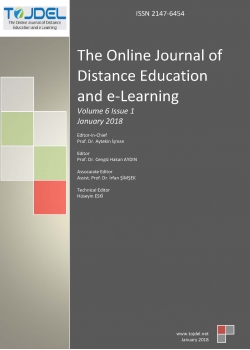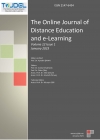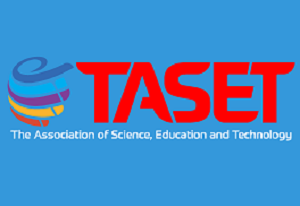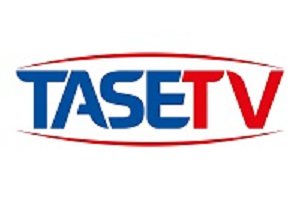TOJDEL - Volume 6 - Issue 1 - January 2018
 AN EMPIRICAL INVESTIGATION INTO THE FACTORS DISTORTING THE RHETORIC OF HUMAN CAPITAL DEVELOPMENT WITH SPECIFIC REFERENCE TO DISTANCE EDUCATION INSTITUTIONS IN TAMILNADU, INDIA
AN EMPIRICAL INVESTIGATION INTO THE FACTORS DISTORTING THE RHETORIC OF HUMAN CAPITAL DEVELOPMENT WITH SPECIFIC REFERENCE TO DISTANCE EDUCATION INSTITUTIONS IN TAMILNADU, INDIA Divya J, Dr. K. Narashiman
Abstract:
Human Capital Development in any organization is an important task of the human resource department. In
distance education institutions in Tamil nadu, especially when the head count working for an enterprise is very
low, human capital management becomes a challenge for the organization. This research is an attempt to
empirically identify the factors that distort the rhetoric of human capital development especially with specific
reference to the distance education institutions in Tamil nadu, India. Primary data in quantitative form has been
collected from 387 distance education co-ordinators distributed across numerous distance education institutions
distributed across Tamilnadu, India. Data collected from survey has been analysed using Principal Component
Analysis Technique with SPSS. The research findings reveal that leadership skills, organizational culture and
training and development practices adapted by the organization stand as major factors in creating an impact on
the rhetoric of Human capital development. The research in addition to that recommends strategies to the
distance education institutions of Tamilnadu in enhancing their human capital development practices.
 BENEFITS OF CURRENT EDUCATIONAL TECHNOLOGY: A COMPARISON OF STUDENT AND TEACHER PREPARATIONS IN A RURAL ILLINOIS SCHOOL DISTRICT
BENEFITS OF CURRENT EDUCATIONAL TECHNOLOGY: A COMPARISON OF STUDENT AND TEACHER PREPARATIONS IN A RURAL ILLINOIS SCHOOL DISTRICT Bonnie Pollock, Adel Al-Bataineh
Abstract:
With an ever-increasing push towards educational technology use, much emphasis has been placed on the
implementation of technology programs in today’s classrooms. The purpose of this study is to identify and compare
teacher and student perceptions of educational technology use in a small, rural school district in central Illinois.
Participants were asked to complete an electronic survey to collect quantitative and qualitative data about their
perceptions of educational technology in the school district. Via a combination of descriptive analyses and
independent sample t-tests, data was compared across school buildings and between student and teacher samples. It
was determined that there are not currently major discrepancies between teacher and student perceptions of
educational technology use in the participating district. Results have implications for only this school district
suggests that district officials do not need to alter policies or practices regarding educational technology at this time.
 EXAMINING FACTORS INFLUENCING STUDENT SATISFACTION IN DISTANCE EDUCATION IN GHANA: A STUDY OF THE INSTITUTE FOR EDUCATIONAL DEVELOPMENT AND EXTENSION, UNIVERSITY OF EDUCATION, WINNEBA
EXAMINING FACTORS INFLUENCING STUDENT SATISFACTION IN DISTANCE EDUCATION IN GHANA: A STUDY OF THE INSTITUTE FOR EDUCATIONAL DEVELOPMENT AND EXTENSION, UNIVERSITY OF EDUCATION, WINNEBA Prosper Gameli Agbanu, Emmanuel Sonyo, Godwin Ahiase
Abstract:
The purpose of this paper is to identify factors that influence students’ satisfaction in distance education
programmes in Ghana. The study used ordinal logistic regression based on a structured hardcopy questionnaire
administered to 309 students of the Institute for Educational Development and Extension, University of Education,
Winneba in the Volta Region campuses, Ghana. The dependent variable in the study is students’ satisfaction while
administrative support services, course evaluation by students, instructor performance and student instructor
interaction constitute the independent variables. The logistic regression results revealed that administrative support
services that focus on students, course evaluation by students, the instructor’s performance and the student instructor
interactions influence students’ satisfaction. In addition, most of the students expressed their satisfaction in the
distance education programme in the Institute for Educational Development and Extension, University of Education,
Winneba.
 ONLINE OPINION MINING SYSTEM TO PREDICT THE QUALITY OF STATE UNIFORM SYSTEM OF SCHOOL EDUCATION
ONLINE OPINION MINING SYSTEM TO PREDICT THE QUALITY OF STATE UNIFORM SYSTEM OF SCHOOL EDUCATION Kathiravan M, Bhalaji N
Abstract:
The children of today will gear up to become the adult citizens of our country tomorrow. The growth and future
of our country highly depends upon the quality of the present school education system. The school education
system must focus on the development of mental aspects, social aspects, physical aspects, and overall aspects as
they step into their adulthood. This paper analyzes the public opinion on samacheer kalvi (Uniform System of
School Education) to predict the strength and weakness of our state school education system. The proposed work
evaluates the quality of the system USSE (Uniform System of School Education) using a novel NLP-based rules
for the tasks of subjective and opinion categorization at the feature level. To synthesize the quality of the
proposed work various quality parameters involved and its opinions have gathered from faculties of higher
education department, school education department, students from different streams and the public through an
online system. Results show that the proposed algorithm able to perform better than Liu’s model in samacheer
kalvi domain, improving both accuracy and recall for the task of subjective and opinion categorization. The
experimental results prove that a redesign in the syllabus of Tamil Nadu USSE is highly recommended.
 POWERING E-LEARNING THROUGH TECHNOLOGY: AN OVERVIEW OF RECENT TRENDS IN EDUCATIONAL TECHNOLOGIES
POWERING E-LEARNING THROUGH TECHNOLOGY: AN OVERVIEW OF RECENT TRENDS IN EDUCATIONAL TECHNOLOGIES Magdalene R, Sridharan D
Abstract:
In the present scenario where the technology is continually changing, there is an increased intensive competition in
the e-Learning industry to make the knowledge transfer more accessible and comprehensible. Education has become
much simpler with e-Learning system making it possible with a mobile device and an internet connection.
Educational technology enables the learning process with the usage of the technological processes which could be
categorized as computer-based technologies and mobile-based technologies. The purpose of this paper is to
summarize the demands of e-Learning and also presents the various educational technologies that works in
facilitating the design and application of the e-Learning systems.
 PROPOSAL AND VALIDATION OF A QUESTIONNAIRE OF EVALUATION OF THE ONLINE TEACHING PRACTICE THROUGH THE STUDENT OPINION
PROPOSAL AND VALIDATION OF A QUESTIONNAIRE OF EVALUATION OF THE ONLINE TEACHING PRACTICE THROUGH THE STUDENT OPINION Jose Alberto LOPEZ-DIAZ, Cely Celene RONQUILLO-CHAVEZ, Martha Imelda MADERO-VILLANUEVA, Ivonne Haydee ROBLEDO-PORTILLO, Javier DENA-HERNANDEZ
Abstract:
Teaching evaluation is a process in which improvements can be done in the teaching-learning process. The
students are the ones who can evaluate teaching activity according to their experience and satisfaction in relation
to the acquired knowledge. The objective of this project was to create an assessment instrument of the online
teaching practice through student feedback. This study collected comments of 110 students that have taken
online courses at the Autonomous University of Ciudad Juarez (UACJ). A questionnaire of 16 items with Likert
scale was drawn up, considering the course organization, pedagogical dynamics, evaluation, and personal and
academic traits. The opinion of the students was transcribed, classified, and codified in similar conceptual
variables; from this analysis the questionnaire was restructured resulting in an instrument of 13 items. This
instrument was evaluated on an online pilot test applied to 441 students from online courses. The validation of
this instrument was estimated through reliability testing based on Cronbach’s alpha. The analysis of the internal
consistency of the instrument based on the Cronbach’s alpha was 0.9. The evaluation of this coefficient is rated
as excellent, so the instrument is viable and reliable to evaluate the teaching practice of online courses at UACJ.
 SCALABLE MULTIMEDIA CODING FOR STREAMING LECTURE CONTENT IN E-LEARNING SYSTEM
SCALABLE MULTIMEDIA CODING FOR STREAMING LECTURE CONTENT IN E-LEARNING SYSTEM Magdalene R, Sridharan D
Abstract:
A new framework SMCeL (Scalable Multimedia Coding for e-Learning) that allows scalable multimedia content
transmission by estimating the bandwidth of the client’s network is proposed. By evaluating the network
condition, the multimedia content is delivered. Scalable multimedia coding (SMC) is the encoding of a high
quality multimedia bitstream which in turn contains one or more subset bistreams. A subset stream is achieved
by dropping either video packets or transmitting only the audio packets to reduce the bandwidth constraint for
the subset bitstream. Hence, the multimedia lecture content is delivered according to the network condition of
the client which enables the client (student) to view the main content of the lecture even in poor network
conditions.
 THE IMPORTANCE-PERFORMANCE ANALYSIS (IPA) ON ACADEMIC AND NON-ACADEMIC SERVICES TO ENHANCE STUDENT MOTIVATION
THE IMPORTANCE-PERFORMANCE ANALYSIS (IPA) ON ACADEMIC AND NON-ACADEMIC SERVICES TO ENHANCE STUDENT MOTIVATION Mery Noviyanti, Raden Sudarwo, Ade Mardiana, Muman Hendra Budima
Abstract:
Student motivation has long been an important factor to learner’s success. In Open and Distance Learning (ODL)
System particularly, student motivation plays a vital role in student persistence and hence to their study
completion. The learner’s motivation may derive from both institutional and personal factors. This study focuses
on the institutional factors by contrasting the student’s perceptions of the importance of the university services
and student’s satisfaction to those provided services. The Importance-Performance Analysis (IPA) of Student-
Faculty of Teacher Training and Education of the Indonesia Open University was conducted on both university’s
services related to academic and non-academic services. The sample of students was drawn from the active
student in online learning, Questionaire was distributed online. The research was analyzed using Importance-
Performance Analysis method. The research showed that 98% positively overlap between student perceptions of
the importance of services and their satisfaction. It means that the provided academic and non-academic services
are being in conformity between student needs and expectation. However, based on the quadrant analysis the
learning materials are located in Quadrant II that is quite distinct from the student’s perception of the importance
and their satisfaction. That means UT needs to improve its learning material related academic services, especially
the services offered by UT’s Online Book Store.






